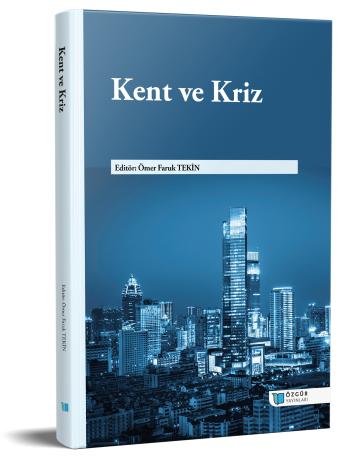
Kent ve Kriz
İndir
Özet
Milenyumun başından beri, dünya üzerinde çok sayıda doğal ve insan kaynaklı afet ve biyolojik felâket yaşanmıştır. Büyük insan kayıplarına ve maddî hasarlara sebep olan bu sıra dışı olaylar toplumlara zor zamanlar yaşatmıştır. Dünyanın gittikçe daha kentsel bir nitelik kazanması, yani nüfusun yarıdan fazlasının kentlerde yaşamaya başlaması bu yerleşimlerin kentleşmenin hızını kontrol edememesine yol açmıştır. Bu husus, kentlerde mekânsal planlamanın özensiz bir şekilde yapılması, alt ve üst yapı unsurlarının yetersizliği, çevrenin ve kaynakların kirlenmesi ve tükenmesi gibi olumsuzluklara, dolayısıyla kentin dış tehditlere karşı savunmasız ve kırılgan hale gelmesine sebep olmuştur. Kentlerin daha dirençli, sağlıklı ve bağışık olması için, yerleşimleri etkileyen ve krizlere sebep olan faktörlerin iyi analiz edilmesi gerekmektedir. Aslında kentlerde, iklim ve çevre sorunlarının, ekonomi, finans, enerji, konut veya gıda yetersizliklerinin büyük krizlere dönüşmesi, kent yönetişimi ve planlamasındaki kusurlardan, doğal ve insan kaynaklı afetlere, teknolojik ve biyolojik felâketlere dayanıklı bir yapının oluşturulmamasından kaynaklanmaktadır.
Bu kitap, kentsel kriz temasının nispeten az gezilmiş patikalarında bir yürüyüş niteliğindedir. Kitap, kentlerin su taşkınları, fırtına ve depremler gibi doğal afetlerin veya pandemi gibi biyolojik felâketlerin yanı sıra krize sebep olan başka sorun alanlarının da bulunduğunu vurgulamayı amaçlamaktadır. Kitapta, öncelikle kentsel kriz kavramı ve krizler çağının kent modelleri üzerinde durulmuştur. Daha sonra bazı kentsel kriz sorunlarına değinilmiş, meseleler kavramsal çerçevesi içinde tanımlanmış, bazı krizler için meselenin bir yönüne dikkat çekilmiştir. Örneğin, yerleşim birimlerindeki su krizi mekânsal planlama bağlamında ele alınırken, kentlerde ekolojik güvenlik konusu ise mahalle perspektifinde değerlendirilmiştir. Kentlerde bireysel özgürlükler krizi ise veri gizliliği, CCTV ve güvenlikli sitelere odaklanarak incelenmiştir. Kent sınırlarını aşan, bölgesel ve küresel boyuta ulaşan krizlere karşı kentsel direnci oluşturmak için, kentler arası uluslararası iş birliği ağlarının önemi vurgulanmıştır. İnsan yerleşimlerinde beslenme krizi üzerinde durulmuş, sorunun nasıl aşılacağı ve gıda üretiminin sürdürülebilirliği konusunda çözümler sunulmuştur. Kentlerde konut krizi olgusu tanımlanmış, bu krize sebep olan faktörler ve krizin çözümüne yönelik bazı uygulamalar hakkında bilgi verilmiştir. Son olarak doğal afetler konusu ele alınmış, Türkiye örneği kentlerde afet yönetimi ve sosyal devlet uygulamaları bağlamında incelenmiştir.

